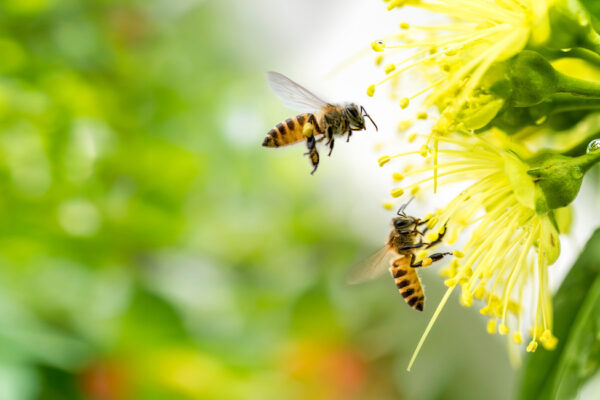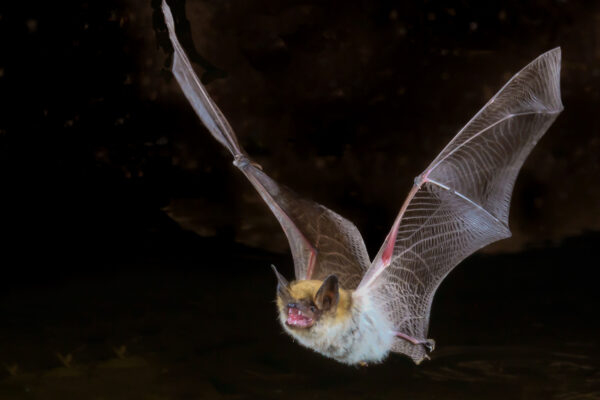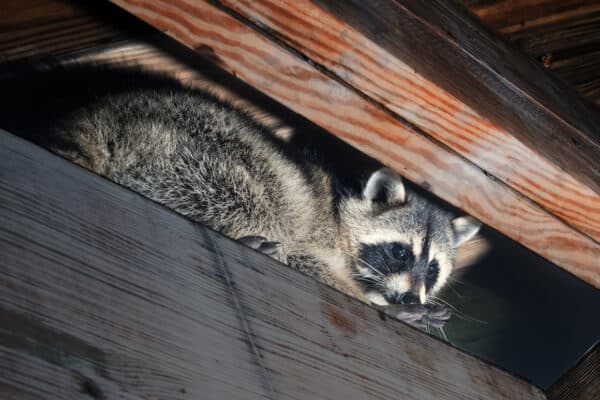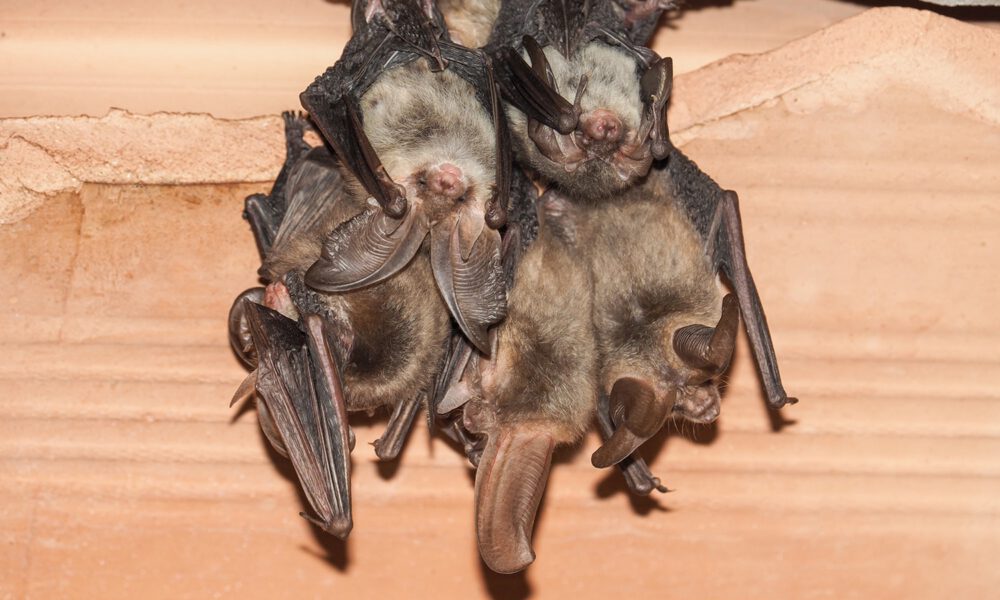
The dangers of bats are very real, and any Alabama resident must be aware of the potential hazards of living among this precious species. When faced with a bat infestation, it’s not as simple as killing the animal on the spot. In fact, our native bats are beneficial to our ecosystem and many others around the world. For this reason, bats are protected by law.
So, for those living near bat populations, it’s only responsible to educate yourself on the dangers of bats and how to address a problem if it arises.
In this blog, Covenant Wildlife Removal shares four major concerns for those working directly with bats or their habitats and those living near native populations who may encounter the critters.
Plus, we explain why bats are protected, despite their threats and how to handle an infestation.
Read on to ensure the safety of you and your loved ones and the well-being of these vital animals.
4 Dangers of Bats
1 | Bats Can Spread Disease.
One of the most well-known dangers of bats is their ability to spread disease to other animals, including humans. The illnesses are often severe, even though the bat may appear perfectly healthy. When humans are infected with one of the various diseases from bats or their droppings, they are often hospitalized. And unfortunately, some cases may even be fatal.
The illnesses transmitted by bats include but are not limited to:
- Rabies- Fatal infection spread through bites, mucus, and scratches from a bat carrying the virus. Infected bats will become ill and die but can still transmit the virus to humans and other animals, like pets, before death.
- Histoplasmosis- This rare lung infection can infect pets, cattle, and humans who have been exposed to droppings of bats. Those working with bats or in caves where bats are present should wear protective gear to avoid contracting this awful infection.
- Salmonellosis– Salmonella is just one bacteria found in bat droppings and urine that cause gastroenteritis. Symptoms include vomiting, diarrhea, and stomach cramps.
If you live near bats or care for them, there are precautions you must take to avoid contracting one of the several diseases they potentially carry. First, be sure not to come in contact with bat feces and urine, where many of these illnesses are found. Wash your hands immediately after working in a cave inhabited by bats or directly working with the animal. Furthermore, avoid the dangers of bats by wearing protective gear like gloves and masks.
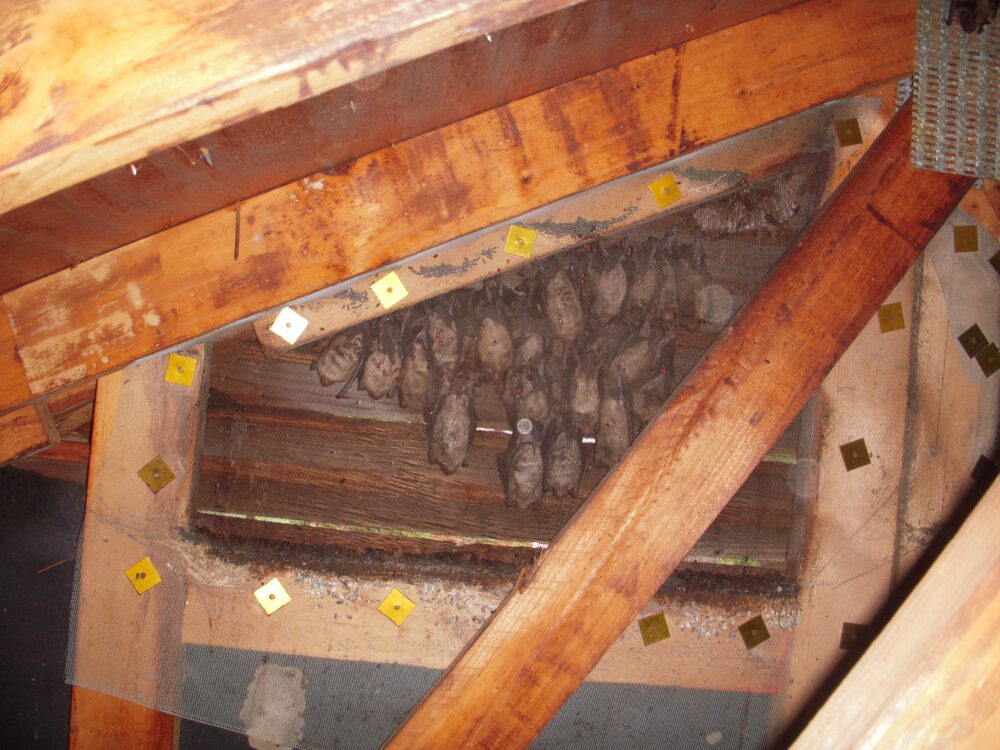
2 | Bats Carry Dangerous Parasites.
Not only do bats carry hazardous diseases, but they also are hosts for external parasites. Batflies, batbugs, fleas, ticks, and mites are commonly found on the bodies of bats and inside bat roosts or nests. These parasitic bugs carry diseases of their own that can spread to humans upon being bitten.
For example, ticks may transmit Lyme disease to a human. You may first notice a large bulls-eye rash around the site of the bite. Then symptoms like fever, headache, and fatigue will follow. Unfortunately, when Lyme disease is untreated, it can spread to vital systems in the body and impact a person’s quality of life.
If bitten by any of the bat’s parasites, seek medical attention immediately. Many of these illnesses are severe and best treated when addressed as early as possible.
3 | Bats May Cause Damage to Your Home.
If bats roost in your attic or chimney, they will cause significant damage over time. This is one of the dangers of bats that more commonly affect the average homeowner. Those who do not professionally work with bats are less likely to contract diseases or be bitten by external parasites. However, if you live close to a native bat population, they may find shelter and safety in your home.
Bats do not directly damage the home by chewing structures. In fact, their droppings are what can destroy your home. Bat feces is very corrosive. If it is not removed, the droppings will deteriorate the surface and compromise your house’s structure.
If bats roost inside, you want to call the professionals as soon as possible to avoid the following:
- Stains
- Odor
- Decaying wood
- Corrosion of vital structures
4 | Bats Contaminate Water.
Water contamination is one of the dangers of bats that may impact specific communities more than others. However, it’s still a hazard anyone living in proximity to bats must be aware of. Suppose you have an exposed water source outdoors. Bats need water to survive and will potentially be attracted to accessible freshwater. Unfortunately, when they come in contact with the water, it is highly likely to become contaminated by their droppings, fur, and urine.
In this case, humans can be exposed to several dangers of bats, like the life-threatening diseases they spread and the many parasites they host. For this reason, it is essential to cover and seal outdoor water containers if you share your space with some of our native bats.
Bats are Beneficial and Protected by Law
Even with the potential dangers of bats, these precious critters are crucial to our natural world and protected by law. In fact, many species are endangered, so their homes and habitats are also protected.
Keep in mind that killing bats is illegal. Therefore, if you suspect an infestation inside your home or worry about their presence on your property, you should contact a wildlife removal company and avoid taking matters into your own hands.
Our native bats consume many nuisance pests and are among our world’s pollinators. Alone, these two roles make them essential to balancing fragile ecosystems. So, regardless of the dangers of bats, their presence is necessary.
Because of their important role, humans must learn to stay safe while sharing our planet with them rather than eliminating their precious populations.
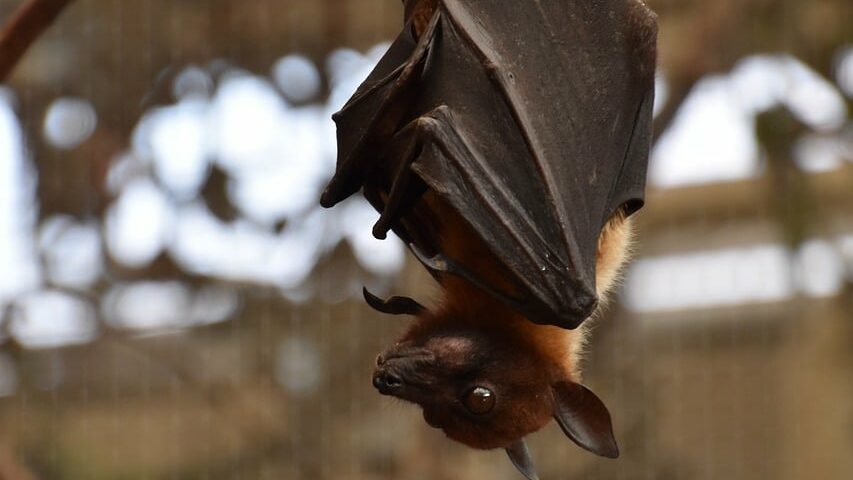
Signs of Bats in Your Home
Bats can enter your home through tiny openings. They are often found in the attic or chimney but potentially dwell in any area.
If you suspect a bat infestation, five major signs will help you determine if you have them lurking in your home.
- Hearing bat activity mainly during the night, like popping, clicking, and scratching.
- Seeing bat droppings, especially in large quantities.
- Smelling the pungent stench of ammonia from their waste.
- Observing stains around small openings throughout the home.
- Noticing bats flying from or around your house in the evening or early morning.
Preventing and Getting Rid of Bats
Avoid the dangers of bats by educating yourself and your family on the proper prevention methods and processes for getting rid of them. As mentioned before, they are a protected species. So, knowing what to do when you have bats as neighbors will help protect you and these essential critters.
Bat Prevention
Seal Openings: The best way to keep bats from entering your home is to seal all possible entryways. This is tedious work because bats can enter through tiny openings. However, if you’ve had previous bat infestations or want to avoid a future issue, thoroughly inspecting your home for cracks, holes, and structural gaps will be worth your efforts.
Using Bat Doors: Additionally, there are chimney caps and bat doors you can install. Some of these devices will block bats from getting in but allow any trapped bats to escape.
Predator Decoys: Finally, you can set up decoys of their top predators to deter bats. For instance, placing an owl decoy near your chimney or roof will likely cause bats in the area to keep their distance.
Bat Removal
If you have an infestation, completely avoid the dangers of bats by contacting your local experts. Experienced wildlife removal companies will know how to remove the bats roosting in your house safely. When you discover the bats, do your best to keep them closed inside the area they have infested. That way, they do not escape to other areas of your home. Then, reach out to the professionals as soon as possible.
Avoid the Dangers of Bats with Covenant Wildlife Removal
Even though bats are a necessary part of our world, they are undoubtedly unwelcome in your home. The dangers of bats include damage to your home’s structure and the potential exposure to terrible diseases and parasites.
If you have spotted bats in your attic or other areas of the house, give Covenant Wildlife Removal a call today. Our experienced team knows how to safely remove bats without harming them.
So, there’s no need to panic. We’ll have them out in no time.
